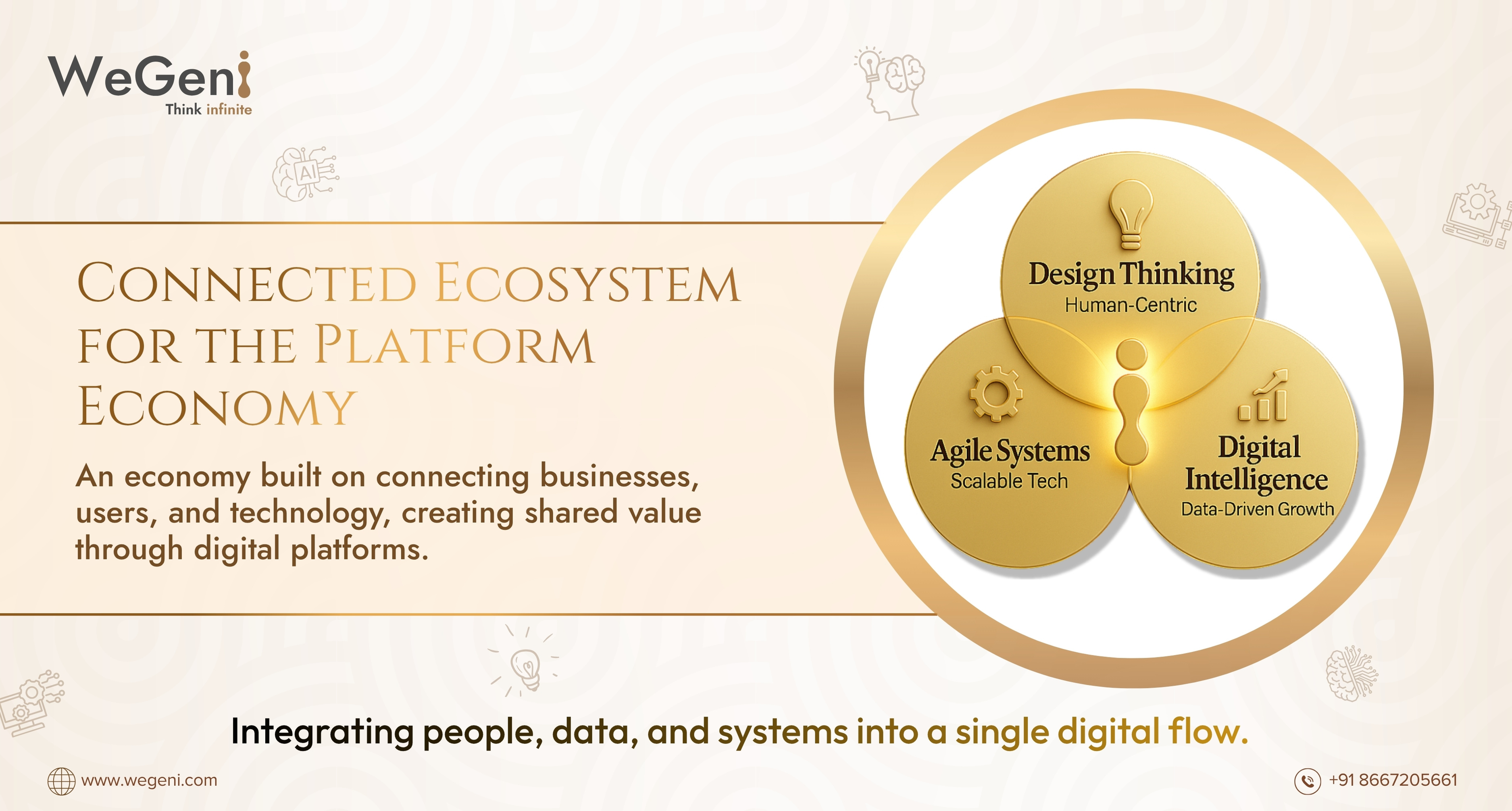
The Next Big Shift in Business Design
The way businesses grow in India is no longer linear.
It’s layered, connected, and data-driven.
Welcome to the platform economy — where value is created not by ownership, but by enablement.
At Wegeni, we believe the platform economy is not just a trend — it’s the new operating system for modern business.
“The platform economy isn’t about what you own — it’s about what you enable.”
What Exactly Is the Platform Economy?
Imagine if your business didn’t have to own every resource — but could connect the right people, partners, and systems to create value.
That’s the core of the platform economy.
In a traditional setup, companies produce a product, market it, and sell it to customers.
But in the platform economy, digital platforms act as connectors — bringing together users, providers, and creators to exchange value in real-time.
Think of how:
-
Zomato connects food lovers with restaurants.
-
Ola connects riders with drivers.
-
Udaan connects small retailers with wholesalers.
These companies don’t just sell products — they enable ecosystems.
They thrive because every interaction — order, ride, or transaction — makes the system smarter, faster, and more valuable.
At Wegeni, we see the platform economy as more than just a business trend.
It’s the future framework of how organizations think, design, and grow.
And we help businesses reimagine their models to fit this new connected world.
1. From Linear Value Chains to Digital Ecosystems
Traditional businesses were built like factories — input, process, output.
Today’s digital enterprises work like ecosystems — connect, engage, evolve.
Think of Zomato or Ola — they don’t own assets; they create value networks.
At Wegeni, we help brands map these networks using Design Thinking and Agile models — identifying what connects their users, partners, and data.
This transformation is not just about technology. It’s about rethinking business flow, customer experience, and data touchpoints — and aligning them into one coherent platform system.
2. Design as the Core of Platform Thinking
A true platform business is designed, not assembled.
Every digital connection — from app interface to onboarding flow — reflects a user-centric design logic.
We apply UI/UX/CX systems that simplify complexity and make multi-user platforms work seamlessly.
When a client comes to us wanting to “go digital,” we don’t just build an app.
We design the ecosystem — the users, the data loops, the engagement journeys, and the content that sustains them.
Because in the platform economy, design isn’t decoration — it’s infrastructure.
3. Data, Insight & SEO: The Invisible Growth Engine
Every interaction in a platform leaves a data trace — a story waiting to be told.
Platforms that know how to listen grow faster.
That’s where our digital intelligence comes in.
We combine SEO, analytics, and content strategy to turn those traces into growth levers.
When we work with brands, we help them not just rank higher, but build discoverable ecosystems — where visibility drives credibility, and credibility drives commerce.
Data becomes the new creative. Insight becomes the new strategy.
4. Platform Business = Collaboration, Not Competition
Platform models thrive when multiple players win together.
That’s why ecosystem design is a core vertical at Wegeni — helping companies build collaborative frameworks across business, product, and digital teams.
Just like Tata Neu connects travel, retail, and finance, or Udaan connects small traders and logistics, we help our clients identify who to connect, how to integrate, and what to co-create.
Collaboration isn’t a soft skill anymore — it’s a business architecture.
5. The Wegeni Model: Building Platforms That Scale
Wegeni bridges strategy, technology, and design to help businesses evolve into platform-ready systems.
We do this through:
-
Discovery & Definition: Understanding the ecosystem and defining success metrics.
-
Design & Development: Creating digital products and workflows that enable interaction and scalability.
-
Deliver & Iterate: Measuring adoption, refining UX, and optimizing digital impact.
From Coimbatore startups to pan-India enterprises, we’ve seen one truth hold:
The future belongs to those who design their business like a system — not a silo.
FAQs
Q1: What is the platform economy?
It’s a digital model where value is created through connections — between users, providers, and partners — rather than just selling products.
Q2: How does Wegeni help?
Wegeni helps businesses redesign their models through design systems, digital strategy, and platform integration, aligning people, processes, and technology.
Q3: Can smaller brands benefit from this model?
Absolutely. Even local businesses can adopt platform principles — by integrating CRM tools, online visibility, and partner networks into one connected system.
Final Take: The Platform Future Is Designed, Not Discovered
The platform economy isn’t a trend — it’s a new operating system for business.
And India, with its digital-first consumers and agile entrepreneurs, is at the forefront.
At Wegeni, we’re not just observing this shift — we’re designing it into existence.
Through strategy, design, and digital integration, we help businesses move from what they sell to what they enable.
Because in the platform era, growth isn’t built in isolation — it’s co-created, designed, and scaled by systems that think together.